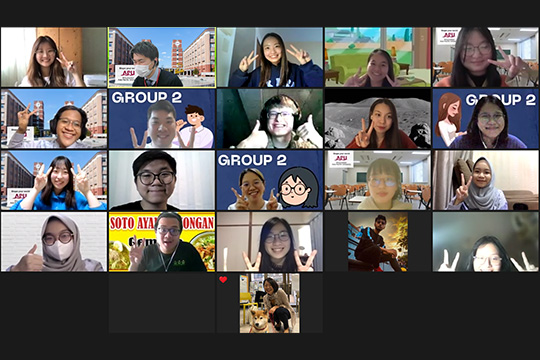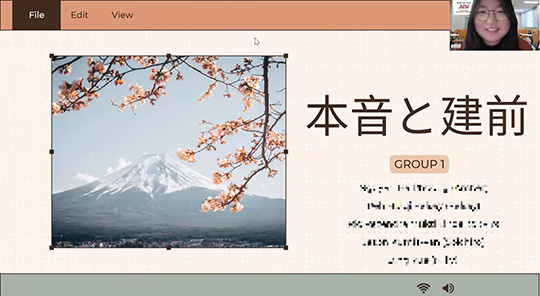FIRST, a program that promotes cross-cultural communication, was held from Wednesday, January 12 to Friday, February 11 for first-year international students.
FIRST is a short-term program in which first-year students travel to a country or region either in Japan or abroad to experience the local culture and society first hand through research activities and interacting with locals they meet for the first time. The program is held in spring for domestic students and in fall for international students.
Usually, newly-enrolled international students travel to northern Kyushu to conduct surveys and interviews with local people, but this time, as the students were unable to come to Japan due to the pandemic, it was conducted as an online Japanese cultural research program instead.
17 students from 8 countries participated in the program, carrying out research in 4 separate groups. In the pre-program classes, the students learnt basic research methods from the program instructor. With the help of senior students, they also chose research topics related to Japanese culture and prepared surveys and interview questions in Japanese
The practical part of the program took place from Monday, February 7 to Wednesday, February 9. In previous years, students mainly conducted research through questionnaires, but in this year's FIRST Program, participating students conducted numerous interviews with Japanese students and citizens who had offered to cooperate with us in advance.
The program also included exchange and interview sessions with domestic students participating in APU's BOOST Program, a program in which domestic students study English, as well as students from high schools where APU graduates work. The participants did their best to carry out their research, even though they struggled using Japanese to coordinate schedules with interviewees via email.
A higher level of Japanese language skill is required to carry out an interview than to ask people to fill in a pre-prepared questionnaire. The participating students have been studying Japanese in online classes, but as they hadn’t come to Japan yet, they had little experience with talking to Japanese people. In this way, the program was very challenging for the students, both in terms of their abilities and their mentality, however; they showed a lot of growth over the course of the practical.
After each group analyzed their research data, the students gave their final presentations on Friday, February 11. The students presented their research in English to allow for deeper analysis and discussion. During the presentations, the other groups actively gave feedback and asked questions by using the online noticeboard tool in real time. Although they were not able to visit Kyushu in person this time, the students were able to deepen their insight into Japanese culture, which is a different culture for them, through direct communication, interviews, and research analysis.
At the end of their presentations, students shared their reflections on the program using their improved Japanese skills. Many students expressed their gratitude towards their teammates, showing the sense of togetherness they built by working together as a team to overcome difficulties even though they were participating online far away from each other
Below are some comments from participating students.
CUT HIMMATUN NAJWAH MANARFA
I was first introduced to the FIRST program by a senior in the APU Kickstart Workshop. As I researched more about the program, I came to find out the opportunity to hone skills such as research, communication, and challenging oneself, which were the reasons I finally applied. Although it was unfortunate that this year’s program was not held on a face-to-face, traveling basis, the program was designed comprehensively and everyone from the professor, TAs, to the participants were highly motivated that the program successfully reached its learning goals. Through this program, I have come to realize that with the right planning, intrinsic motivation and discipline, and teamwork, the current circumstances should not make us defer from growth opportunities. Alongside improving the skills mentioned previously, FIRST is also a great opportunity for international students outside of Japan like myself, to interact more with Japanese people in Japanese and learn in-depth about a specific Japanese culture.
Adeline Olam
Learning in a divergent environment while being faced with the limitless possibilities as a university student has made me realize that I am eager to delve deeper into the diverse and inclusive APU. Through the FIRST program, I was able to connect with other people who have various cultural backgrounds and different upbringings. It was a very empowering experience for me. Of course, there were challenges and obstacles that we had to overcome, such as facing the language barrier and finding the group dynamics. However, I was grateful that I could join the FIRST program as I was given the chance to make plenty of meaningful memories with my classmates while expanding my knowledge and experience in terms of teamwork, communication skills, inclusivity, and the basics of research. Participating in the FIRST program has shaped me into a more open-minded and proactive person, which I believe has brought me one step closer to becoming a better global citizen.












